«Being a priest today requires courage»
Don Anthony Laureta is a priest and parish priest of Santiago el Mayor in the city of Imus, in the Philippines, but before that he worked in the formation of seminarians in his diocese
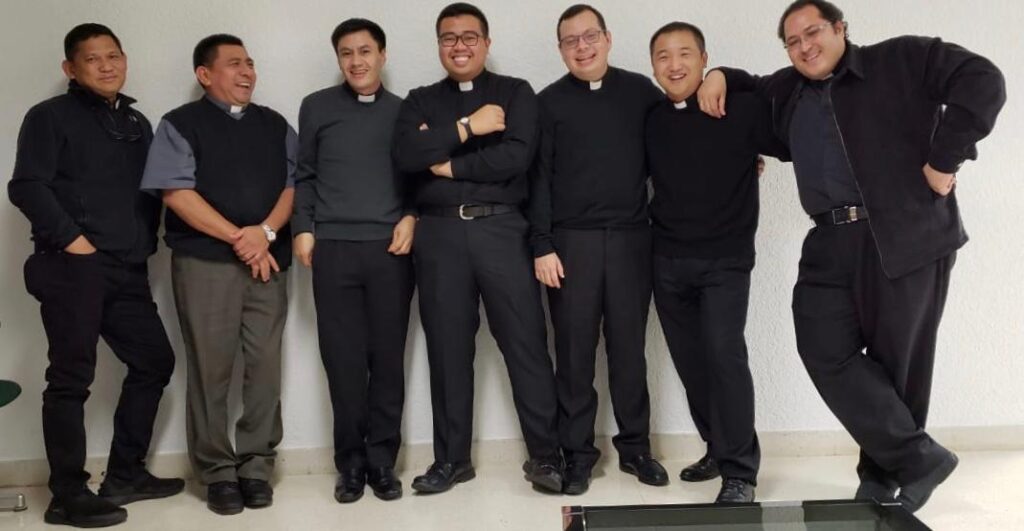
During his stay in Spain, this priest served the Filipino community living in Barcelona. He studied in Pamplona thanks to the study grants funded by the CARF Foundation. When he analyzes his career, he believes that the great challenge for priests is to receive ongoing and doctrinally sound training that allows them to respond to the great questions of today’s man.
Anthony’s priestly vocation
Don Anthony Laureta could have been an engineer, although in reality now he also plans and builds, helping God as a priest in his work with humanity. «Maybe I could have been a good engineer in the Philippines, since my father saw potential in me, but God also has his plan to be what He wants me to be,» he tells us.
The truth is that faith has always been present in his home in the Philippines, so much so that his parents had no qualms about supporting him in his decision to become a priest, sacrificing what they believed would have been a good career path.
“The deep faith, hope and love of my family has contributed greatly to my vocation; from our grandparents who used to take us to church every Sunday, praying the Rosary every day before going to sleep, to observing all the traditional Catholic devotions, especially during Christmas and Easter,” says Don Anthony.
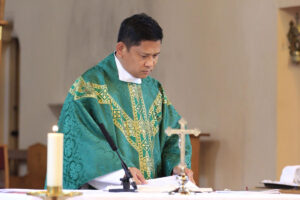
Seeing God in suffering
His story is a journey of trusting in God, even in the most complicated situations, precisely when many, instead of embracing faith, move away from it. Thus, he recalls, “it was hope in providence that shaped in me the quality of being able to be attentive to the needs of others, particularly when our city of Imus had been devastated by typhoons and natural disasters.” What’s more, he recalls that it was his mother’s prayers that awakened in his heart and mind the power to trust God in the midst of helplessness and vulnerability.
It is not surprising that growing up in this very religious environment awakened in little Anthony this call to be a priest. His home was very close to the diocesan seminary and the cathedral, so many activities in the neighborhood were linked to Catholic devotions and traditions. “This type of environment helped to awaken my awareness of wanting to be a priest from my childhood,” he adds. That thought that awoke in him as a child accompanied him during his adolescence in the Philippines.
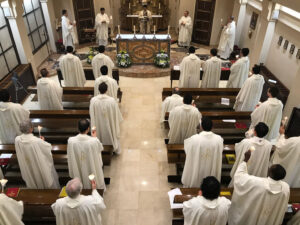 Anthony says that the Somascan brothers accompanied him in his discernment until he entered the congregation, but on a new path of discernment he finally saw clearly his call to be a diocesan priest, specifically in his native diocese, in Imus.
Anthony says that the Somascan brothers accompanied him in his discernment until he entered the congregation, but on a new path of discernment he finally saw clearly his call to be a diocesan priest, specifically in his native diocese, in Imus.
Renewing his priestly mission
This priest from the Philippines, once ordained, was sent by his bishop to the University of Navarra, in Pamplona. He was there between 2018 and 2020 studying for a degree in Moral and Spiritual Theology.
«My stay in the community of priests in Zizur Mayor, Barañáin and at the University of Navarra was very fruitful and significant in my priestly life. The experience I lived with priests of different nationalities, with lay people and priests, as well as with our teachers, spiritual directors, confessors, mentors and friends, contributed a lot to renewing and reforming my perspective on priestly life and mission», Anthony confesses.
His experience in Pamplona – he reiterates – deepened and broadened his understanding of the global reality of the Church. «My experience of community life with priests really helped me a lot. We came from different parts of the world, but we lived as one community. In fact, it is an experience of how beautiful the Church is. Unity in the midst of diversity can be real and true, and this renewed my spiritual, pastoral and missionary life as a priest,” he adds.
He also considers that this time was crucial for growing spiritually and enjoying the importance of ongoing formation for priests. In this ever-changing world, his studies in Pamplona helped him to better understand the various challenges he faces every day in his pastoral work.
His stay in Navarre
However, what most caught his attention during his formative stay in Spain was the care of the priests that he experienced in Navarre. “It was an experience of ‘coming home’, like the first years of formation in the seminary, where they teach you, guide you, accompany you and bring out the best in you. But, this time, it was a different environment, since all my classmates were already priests. It was a space to awaken and go deeper into what priestly life is and how to truly be a priest,” he says.
Since he was ordained in 1996, almost half of his priestly ministry has been focused on the formation of the seminarians of his diocese, both in his preparatory stage and in the teaching of Theology, thanks to the studies he carried out in Pamplona with the support of the CARF Foundation. As he points out, it is a very rewarding job, since he has accompanied numerous young people who are now members of the presbytery who perform very well in their respective ministries in the diocese.
But in his career he had another interesting Spanish adventure. For five years, between 2013 and 2018, just before arriving in Pamplona, he served the Filipino immigrants living in Barcelona. About that experience he remembers: “Walking with migrants is really like a ‘pilgrimage’. I not only walked with them, but I was also touched by the way they walked with me, in all circumstances and moments, whether it was joy, pain, loneliness, laughter… I also saw how love unfolded in their lives while they worked very hard for their families.”
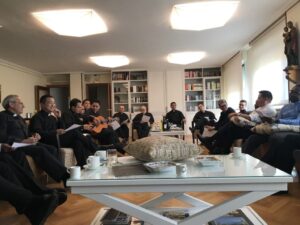 The grace of a good formation
The grace of a good formation
Asked about the challenges of today’s priests, Anthony is clear and speaks mainly of the urgency of the ongoing formation of priests. “The priestly ministry in our time requires much courage, a grace that we must receive and embrace, as the apostles did in their missionary work; therefore, having the opportunity to take time for study and ongoing formation is, in fact, a grace,” he explains.
For this reason, he considers that the CARF Foundation clearly responds to this great challenge of the Church by making this concrete effort that is so beneficial for the integral formation of priests. And that is why he has a special memory for the benefactors of the foundation, to whom he assures that he is truly grateful for their sacrifices for the Church by helping her send priests from all over the world to continue their studies in Pamplona and in Rome.
“Your participation in the formation of good, prepared and holy priests is truly a gift for the Church. You are a blessing for the Church! I pray that your apostolate and ministry continue to be blessed, and that the Good Lord sends more good and faithful servants to embrace the vision and mission of the CARF Foundation,” he concludes.
Related

Pope Francis spent a peaceful night
Exaudi Staff
02 March, 2025
1 min
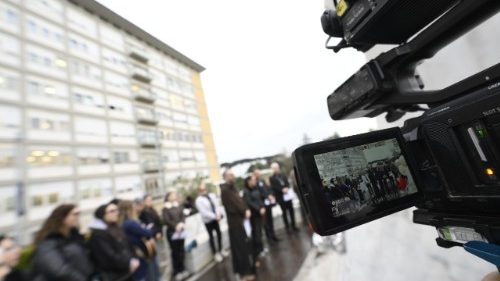
Pope Francis has had a peaceful night
Exaudi Staff
25 February, 2025
1 min

What should the boyfriend or girlfriend I should find be like?
Patricia Jiménez Ramírez
24 February, 2025
4 min
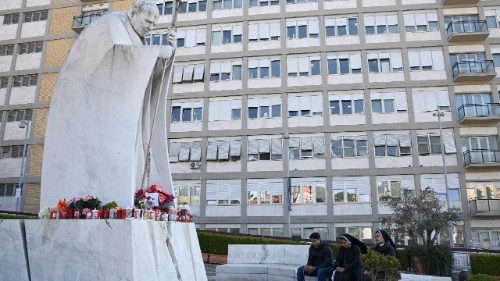
The Pope spent a quiet night at Gemelli
Exaudi Staff
23 February, 2025
1 min
 (EN)
(EN)
 (ES)
(ES)
 (IT)
(IT)

